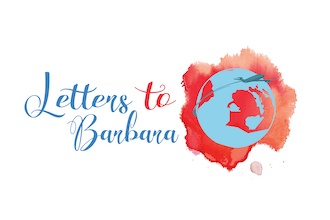Dear Barbara,
It’s not easy for me to leave Athens behind and travel to a nearby destination like Aegina. You see, for me, proximity matters: whenever I feel that something is too close to Athens, I feel that I am not really traveling. For example, I have never been to Rome; it always seemed way too close.
Why did I travel to Aegina, then? Well, I lied to you -or at least I didn’t tell you the whole truth. On the one hand, the proximity, but on the other, my eternally itchy feet. I took the decision a couple of days ago. There are several ferries leaving from Piraeus each day: six or seven, plus the Flying Dolphins, which are fast. But I prefer the slow way, the ferries allow you to be on the deck, to smell the sea, to feed the seagulls, to be thoughtful.
The ferry is relatively cheap, and it takes less than one and a half hours. Mid-way to Aegina a bunch of tankers uses the sea as their parking lot. The sea is quiet today. Next to me, two Catholic nuns are enjoying the journey. They chat non-stop in some language that I fail to recognize. But they consume the biggest amount of potato chips I have ever seen. Two women in their late forties dressed in a uniform of faith, eating chips from a bag. Every now and then, they walk up and down the deck without paying any attention to the wind; their long skirts swirl constantly, but they don’t seem to care.
Arriving at Aegina
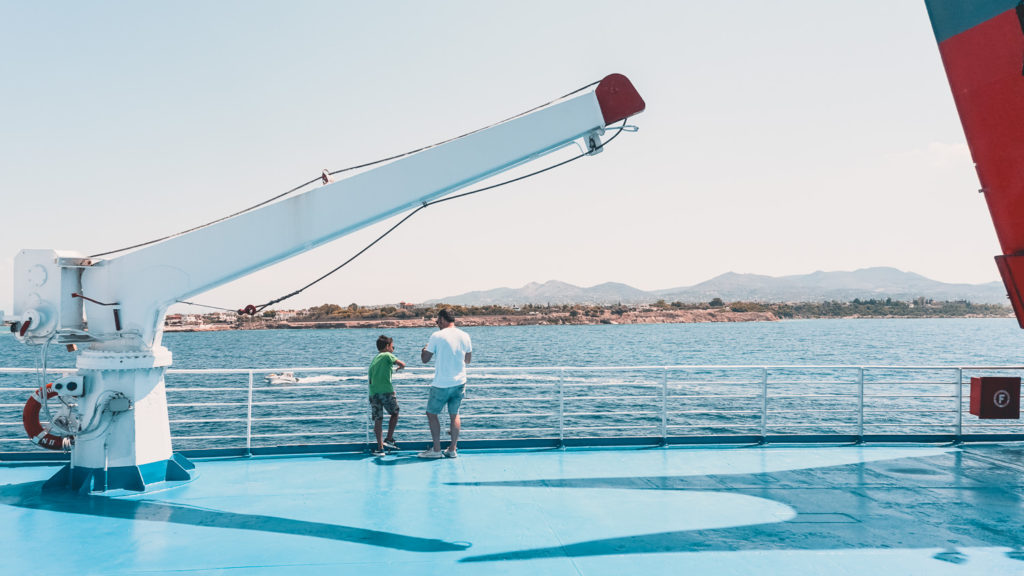
The ferry reaches Aegina on time. It is the middle of August, the middle of the day. The island is packed, but some local women complain that this year it looks rather empty. I ask them what their definition of packed is. “Ah,” says one of them, “like in the golden days of Aegina.” This quite abstract statement is probably a forgery of the past and a synonym for lost youth.
We are soon becoming one large crowd: people that disembark vividly. I try to find my way through countless suitcases, rushing cars, and guys offering accommodation. It is not my first stay in Aegina but it’s the first time I visit the island in the super high season. This time, I have booked a room far away from the town. I was never fond of packed places when I wanted to swim. My definition of the sea is very close to the definition of loneliness. If I can be the only one on the beach, I’ll be the happiest man on earth.
I have heard of a place called Vagia in Aegina, and that’s where I’m heading. It is located in the northern part of the island, and a car takes about twenty minutes to reach it. One can travel a hilly way or take the seaside street. I took the hilly way, and indeed, twenty minutes later, I’m there.
You’d better not talk with me about music
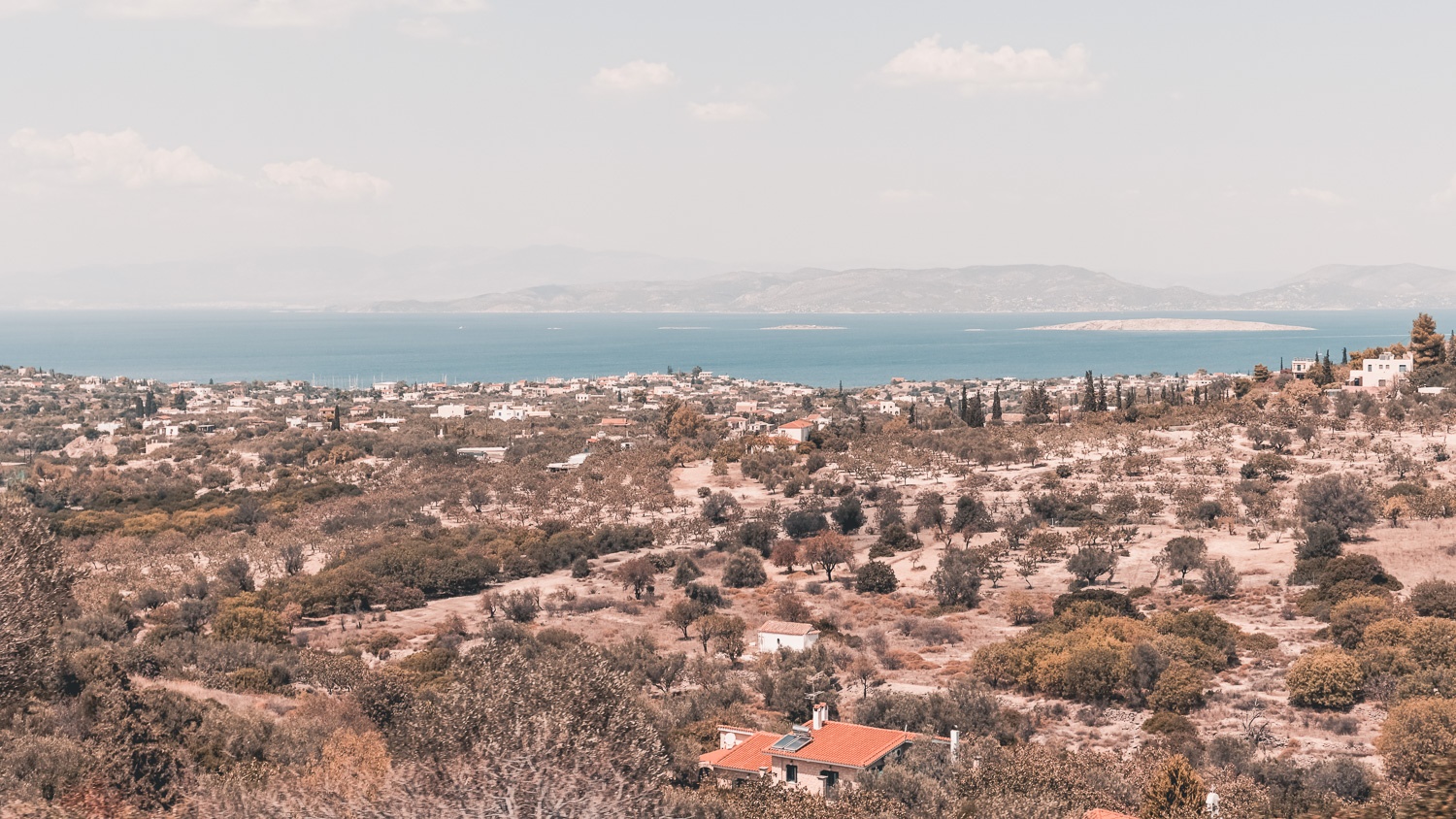
The first thing I hear when I arrive at Hotel Vagia is “You ‘d better not talk with me about music”. There are two teenage girls on the table, a guy with relatively long white hair and a woman, probably his wife. I see them sitting in the yard; they are tanned, and they are definitely tenants.
There is some vivid quarrel about classical music going on: who is the best violinist in the world? One of the teenagers mentions a name that I have never heard of, while the older man gets pissed more and more after every sentence he hears. He keeps repeating every now and then, “You ‘d better not talk with me about music”. To me, he looks like a very opinionated musician.
Meanwhile, the owner of the hotel brings me a beer. “That’s on me -welcome”, he says. This is a family-run hotel, and the owner is polite and omnipresent. I drink the beer slowly and I enjoy the musician’s arguments. I then go to the bedroom, which is clean but relatively dated -and therefore totally compatible with the island. The most important things are there, though: the air-conditioner, an ashtray, a small balcony, and the cicadas.
I don’t spend more than ten minutes in the room. I wear my swim trunks and close the door behind me.
Three villas after the church
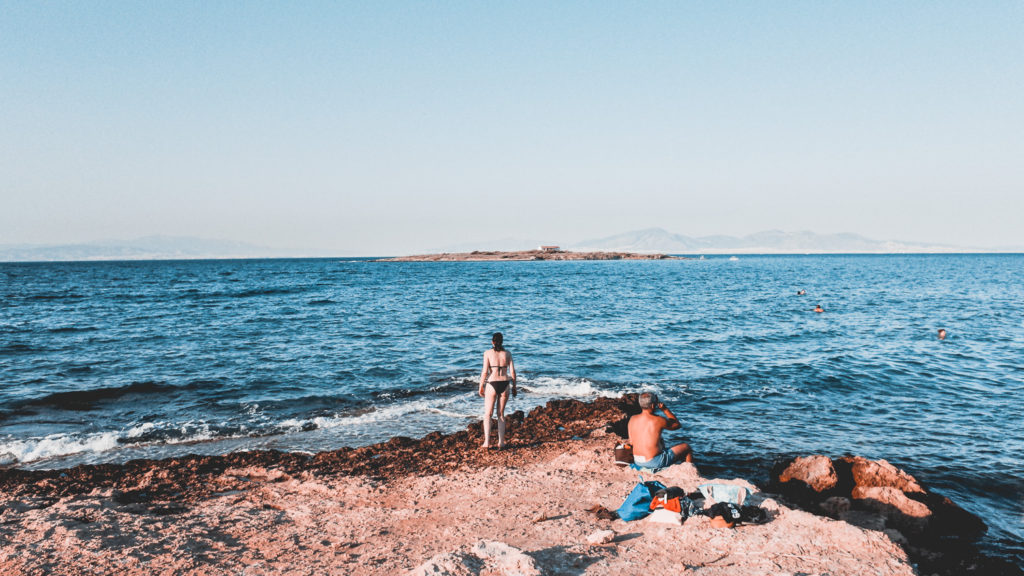
The islands have their own language, which consists of long sentences describing simple things. I have asked if there is an isolated beach nearby and I was prompted to take a path when I see three villas after the church. The first three villas I see have no path next to them. I then see some buildings and try to understand if there is a triplex of villas among them.
About ten minutes later, I do see a path, and only later I realize that next to it, there are three villas standing. I walk the path all the way down, and I find myself among rocks and loners. This is the beach of Tourlos, and the water is clear. It borrows its name from the nearby tiny island, which hosts only a church on its ground. I keep on walking until I find a small bay where I lay down on the hot sand. It’s just me and the cicadas.
I spend several hours there and try not to think at all. It doesn’t seem that hard: the sea is calm, the tiny island is quiet, and the sun is burning. I have a book with me, but I don’t read a single page. Every half an hour I get into the sea, I swim for twenty minutes and then I lay down on the sand. I repeat this for more than five hours. My face is burned but I only realize that when I’m back at the hotel. I am part man, part red mullet.
The temple of Aphaia in Aegina
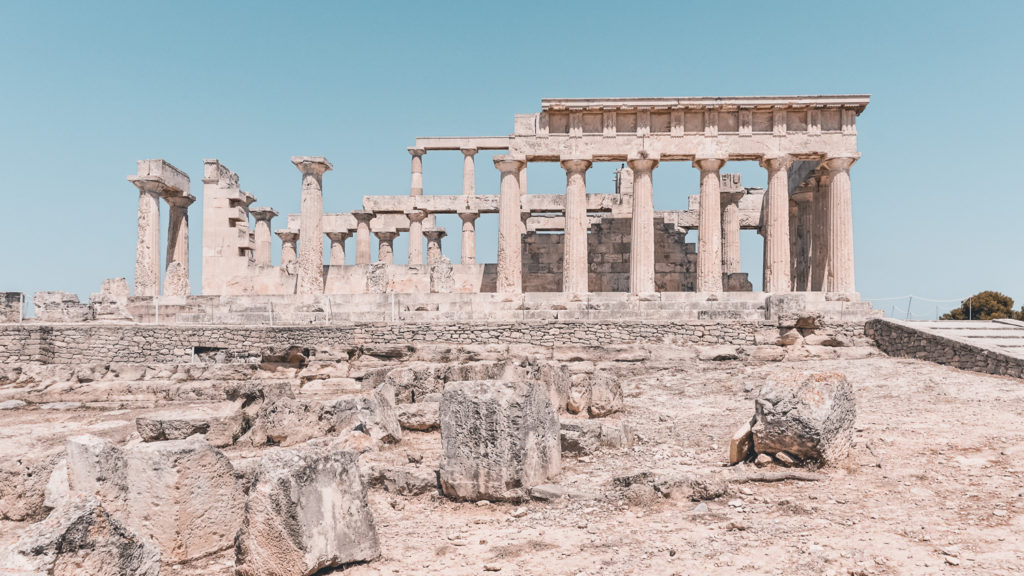
The following morning, after a delicious homemade breakfast at the hotel, I decide to visit the Temple of Aphaia. This is one of the oldest Doric temples in the world, and it’s a short drive from the hotel. The road is steep and gets narrow very quickly. I find it odd that I can’t see the temple from the road.
Even when the car stops in a parking lot in front of the entrance, the temple is not yet visible. The ticket costs 6 euros, and after climbing a couple of steps, the temple is finally visible. It’s a very well-preserved building that emerges from the white rock like an ancient wave. Built between 570 and 510 BC, the temple of Aphaia is assumed to be a masterpiece and also a prototype for the Parthenon.
The heat is extreme, and I decide to find a shadow and spend some time staring at the temple. The sea is visible, but up there, on the top of the hill, the most important element is the pine trees. Cicadas and pine trees have always meant to me Summer in Greece. There are only a few visitors and they are all wearing hats.
Lots of people believe that the temple of Aphaia, the Parthenon, and the temple of Poseidon at Sounion form an isosceles triangle. From what I read so far, this seems invalid: back in the day Aegina and Athens were enemies; apart from that, there is no proof that such a calculation was possible back then. Nonetheless, for those seeking symmetry, this is a nice fun fact. I, of course, add myself to the crowd of Symmetrians.
Add some sea in a bag
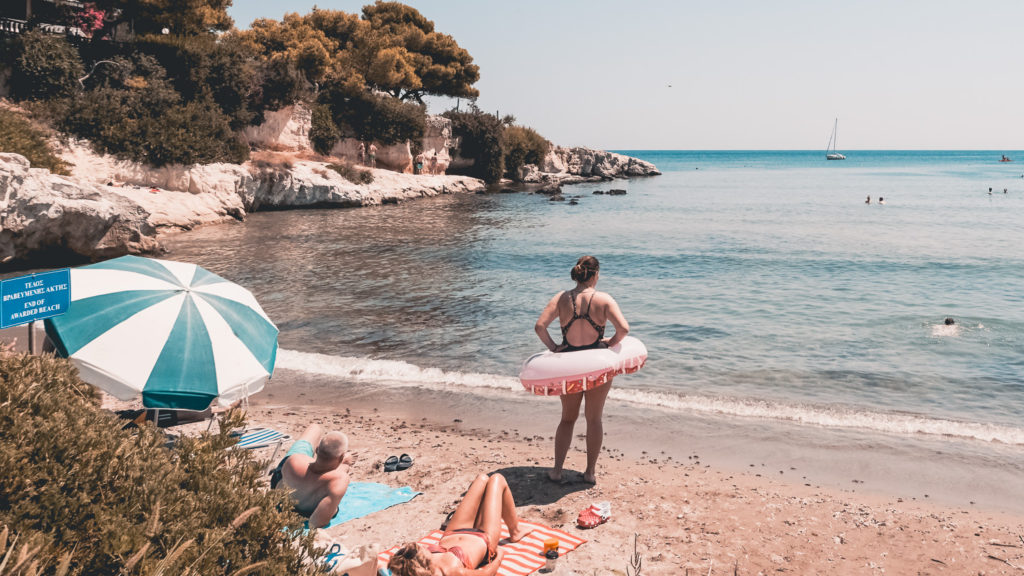
About an hour later I’m headed towards Agia Marina. From what I heard so far, this is the nightlife spot of Aegina. The truth is that I mainly see young people there, and every second building is either a cafe or a bar. But I’m there early in the afternoon and I can only make assumptions. I suspect that the beach is crowded, and indeed it is. There seem to be millions of people in the water, therefore I turn around and think of leaving Agia Marina behind.
But I am quite unsure about where should I go next. I’m definitely in a wanderlust mode, hence I decide to discover furthermore the island. I need provisions, though: I have just run out of water, and I have nothing to eat. As I walk down the street, I see a mini-market. Fruits, vegetables, and a guy throwing watermelons in a huge box as if he’s playing some old game. I grab a couple of tomatoes, and I ask for gruyere, preferably cut into pieces. The woman is really helpful, and she’s offering me a glass of water while she’s cutting the cheese; it’s insanely warm, and I’m sweating like hell.
I then ask her if she has a special bag, one that keeps the products cool despite the heat. She says, “Unfortunately not”, but she then comes up with an idea. After wrapping up the cheese she says: “You should put the cheese in a plastic bag. Then, you take another bag and add some sea to it. Place the bag with the cheese into the bag with the sea. It should work just fine.”
To my surprise, it actually does. Several hours after swimming, I’m lying on the beach. I grab a slice of gruyere, and the cheese is still fresh.
The town of Aegina 200 years later
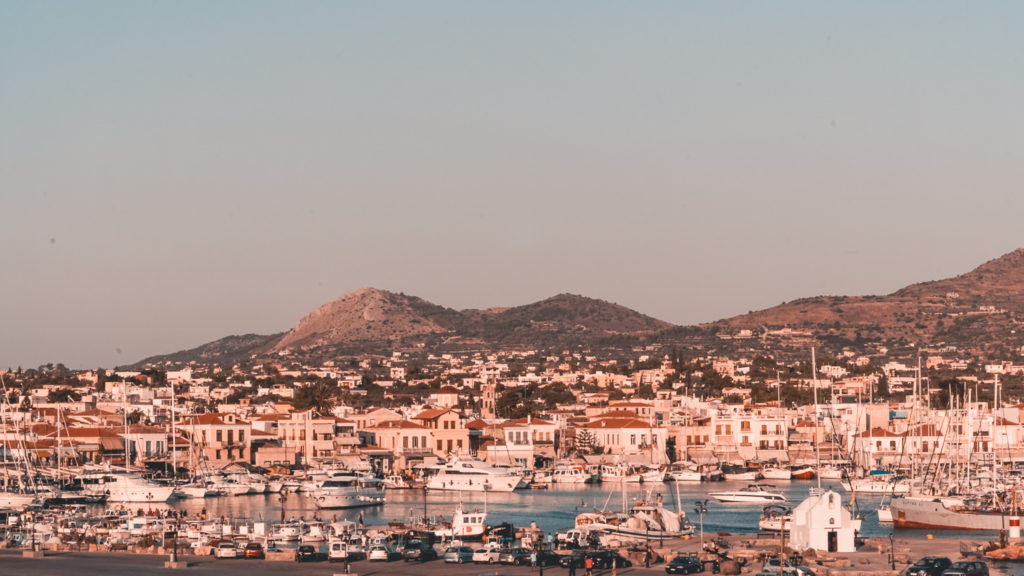
The main settlement of the island is also called Aegina. It is a vibrant little town with a busy port. The vessels are countless, and the passersby are too. The island is crowded, and it has probably exceeded its maximum capacity. I try in vain to find an empty spot to have a soft drink, but it proves to be hard. Half an hour later, I buy an Iced Tea from the kiosk, and I’m searching for a bench. It’s not that easy to find one, either.
The sun is intense. Aegina is famous for its pistachio production, and you can buy them everywhere. There are stands all along the port, claiming to have the best pistachios in town. I buy half a kilo from one of them, and I keep walking through the streets. At some point, I end up again at the port, in front of a yacht with an odd name: “200 years later.” I wonder what this means, but unfortunately, the owners are absent.
I have a couple of ideas about the meaning, but the one that seems more accurate is that this is a reference to the island’s past. Between January 1828 and October 1829, Aegina was the capital of Greece. Hence, this is a tribute to Aegina two hundred years later. Well, this explanation falls about a decade short, but to me, it seems relatively reasonable.
I thought to spend the last night of my short escape in the town of Aegina, but there is not a single bed free. It would have been nice to watch a movie in one of the open-air cinemas in the town, but this seems impossible. Even at the Aeginitiko Archontiko, where I know the owner from a previous visit, there is no availability. I soon realize that I have to hit the road again.
In fact, I must desperately search for a beach.
Not so happy at the Klima Beach
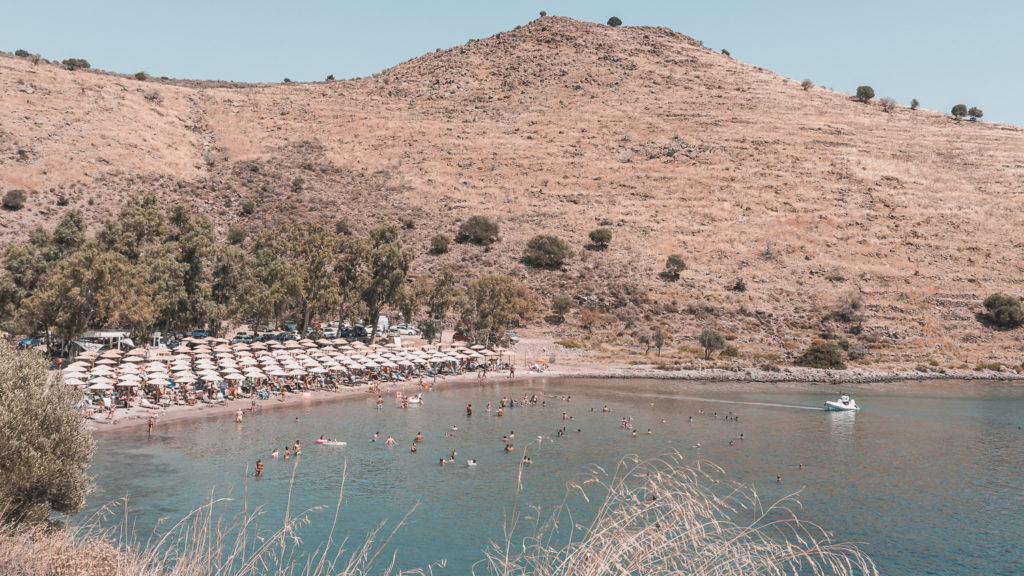
I move all along the coast of Aegina like an impatient dot on the map. I stop twice to see some of the most famous beaches of the island: Marathona (a disappointment, packed beyond words) and Perdika (a family beach, nothing special, could be in Eastern Peloponnese). There are also some small bays on the way, but they seem rocky. After touring around Aegina for a couple of days, I have to admit that I’m unimpressed by the beaches. They are really decent, but not what you’d expect from a Greek island.
I seem to have one of the stubborn days, which means that I -among other things- complain a lot. On such days, I barely give up, and I try to find a great alternative (not just a decent one). After Perdika, the road continues towards a more quiet area of the island, on the very south. The map indicated that at some point, the road stops, and the rest of the island is isolated. At this very spot, there is a beach called Klima. I have no further information about it, nor I heard anything before, and I decide to go there.
The road becomes narrow again and splits into several directions. It seems to be just a main street (bad-quality asphalt, bumpy) that bifurcates into tiny roads. Fifteen minutes later, in that maze, I have to take a left turn. The sign informs me that Klima Beach is less than a kilometer away, and I feel joyful, almost happy, because of the anticipation.
But on the last turn, there seems to be something wrong. I see one yacht close to the beach, then a second, a third, and in a few seconds, I’m unable to count them. An instant later, I see Klima Beach: It has countless umbrellas and loads of people. Right here, on the very edge of Aegina, I remind myself that it’s mid-August and every place has to be packed. My ferry leaves in a couple of hours, and I’d rather wait at the port and take photos. I also remind myself of the advice I’ve given myself in the past: if I have a stubborn day, I’d better stay home.
But I bet you know that already.
Yours,
George
More about Aegina: Things to do in Egina & A vast reminder of childhood
More Greek guides: How to book ferry tickets, Domestic Flights in Greece, 10 Greek Beaches off the radar
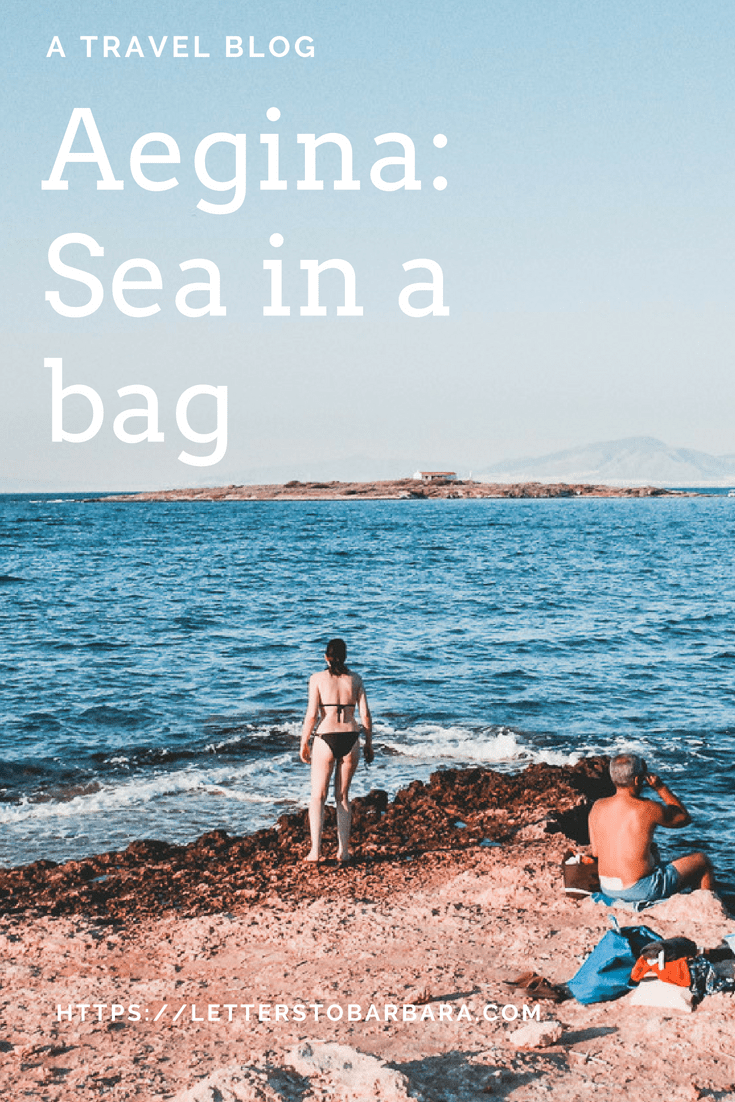
Please share, tweet, and pin if you enjoyed reading Aegina: Sea in a Bag. Your support keeps this website running and all the info up-to-date. 🙂
Last Updated on June 18, 2024 by George Pavlopoulos
